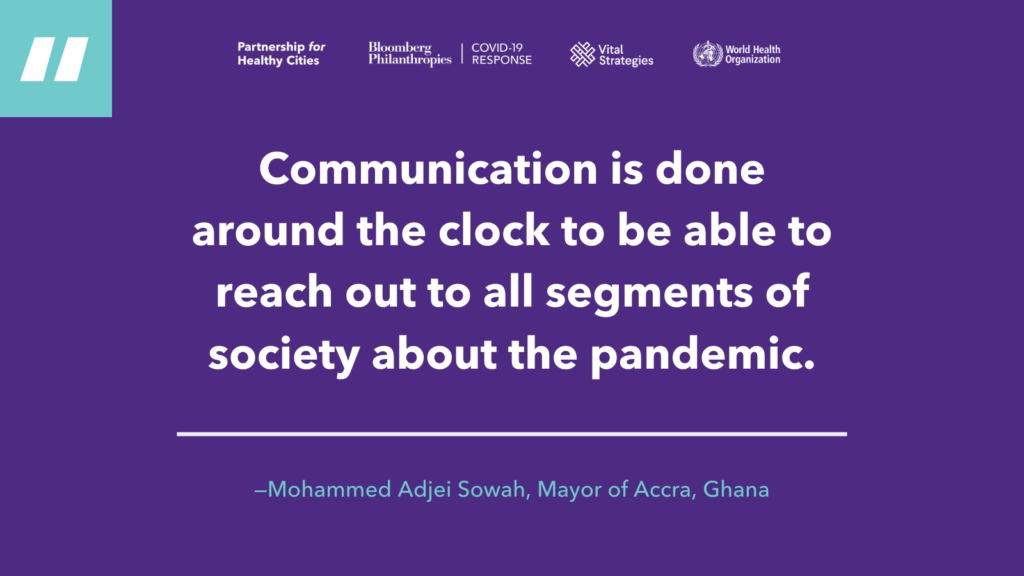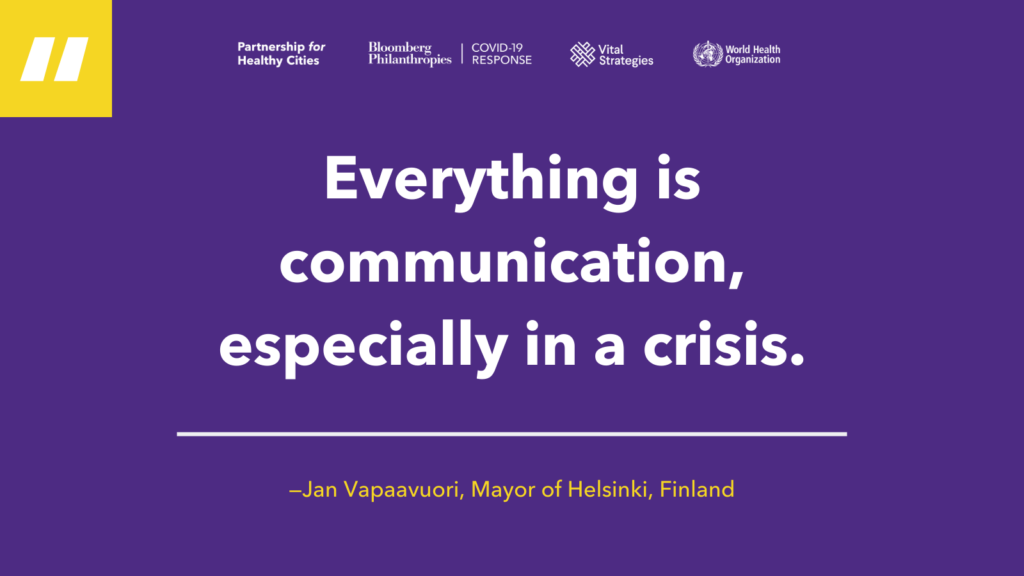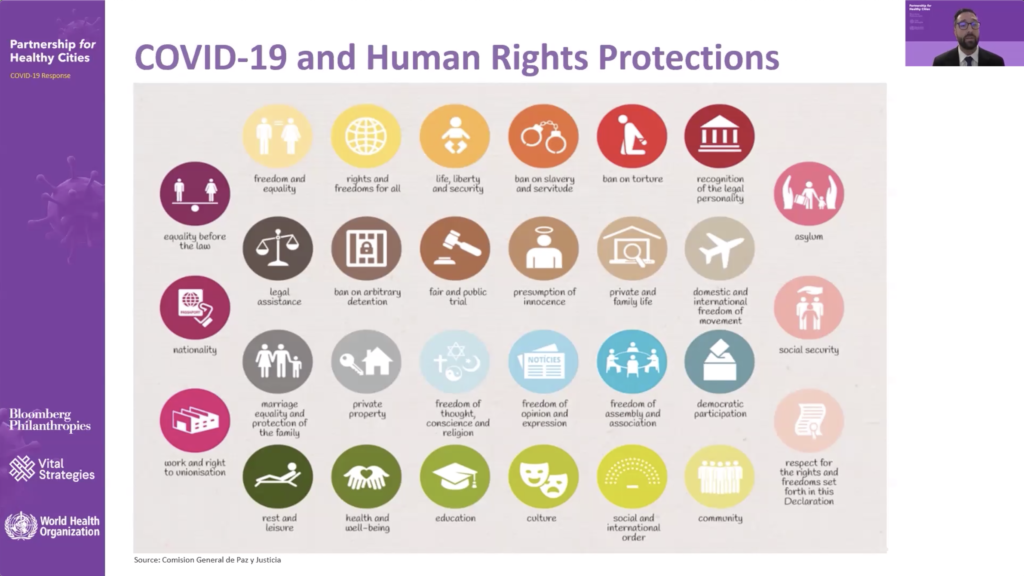Webinars feature expert guidance from former New York City Health Commissioner Dr. Mary T. Bassett, Accra Mayor Mohammed Adjei Sowah, Helsinki Mayor Jan Vapaavuori
The COVID-19 pandemic has proven most intense in urban areas, and it is in our cities where we will most see and feel the results of actions to combat the crisis. It’s essential for urban leaders and health officials to have access to the most up-to-date information and tools to guide their response. The Bloomberg Philanthropies Partnership for Healthy Cities COVID-19 Global Leadership Series continues to meet requests from cities worldwide for technical expertise and support in this unprecedented era.
High-level representatives from 20 cities around the world, including five mayors, joined a webinar on Tuesday, April 28 to discuss approaches to communication during the COVID-19 crisis. Dr. Mary T. Bassett, Director of the François-Xavier Bagnoud Center for Health and Human Rights at Harvard University and former New York City Health Commissioner, urged participants to empower public health to take the lead during the pandemic. Her words were echoed by two veteran health communicators: Sandra Mullin, Senior Vice President for Policy, Advocacy and Communications at Vital Strategies, and Melinda Frost, Technical Officer for Risk Communication and Community Engagement at the World Health Organization.
“You as mayors know better than anyone that the people who will solve this are your residents. It’s a matter of people changing their behavior, and to do that, they need to trust us.”
Dr. Mary T. Bassett, Director of the François-Xavier Bagnoud Center for Health and Human Rights at Harvard University and former New York City Health Commissioner
All three emphasized the importance of integrating crisis communication into cities’ incident command structure from the start, citing lessons learned in earlier urban health crises about building public trust. City leaders were advised to: practice open communication and lead by example, manage a fully engaged media through regular briefings, stomp out misinformation by deferring to science, and engage community leaders and champions who can assist outreach to diverse and vulnerable populations.

Participants also heard directly from two mayors deeply engaged in their city’s COVID-19 response. Because the city of Accra serves as the economic center of Ghana, Mayor Mohammed Adjei Sowah faces the challenge of protecting not just the two million people who live there, but an additional 1.5 million Ghanaians coming to the city each day to work or shop. Communication around the clock, paired with education, community engagement and support from religious leaders, have proven invaluable. Compliance with the prevention protocols is high.

In Helsinki, Finland, public health measures have successfully limited the spread of the virus but taken a high economic and social toll. Mayor Jan Vapaavuori noted that open, honest, proactive communication with the urban population contributed to acceptance of restrictive measures despite associated challenges, and that trust in local government remains high.
On April 30, 121 technical leads and other colleagues from 57 cities convened for a technical webinar on the “Ethical and Legal Considerations for a City Response.” Presenters noted that even in the best of times, city governments need to fill gaps in national, provincial or state laws while using legal discretion to tailor national policies for the local context. The importance of this process is elevated during the COVID-19 pandemic, with urban leaders needing to apply a range of measures that shift as a city moves through each stage of the epidemiological curve.

Aaron Schwid, Legal Director of Policy and Programs at Vital Strategies, highlighted the importance of an agile legal system that can quickly respond to changing circumstances. Physical distancing measures—including school and work closures, canceling mass gatherings, travel restrictions, banning all non-essential services and curfews—remain our primary defense against the virus until an effective vaccine is developed. These measures will be iterative and nuanced, and work best when enacted swiftly. Yet because they also represent major limitations on our fundamental rights, physical distancing measures have to meet several criteria. They must:
- Be enacted in accordance with the law at the time;
- Further a legitimate public health objective;
- Be evidence-based and the least burdensome option to achieve the objective;
- Be applied without discrimination;
- Be of limited duration and subject to independent review.
“There’s no ‘right’ way to do this, and every city will need to adjust its laws to fit its needs. They key is finding the right balance between precision and speed.”
Aaron Schwid, Legal Director of Policy and Programs at Vital Strategies
For city leaders, one of the greatest challenges in the pandemic response will involve decisions about tightening and loosening public health measures and how to provide the financial and social support needed by residents to comply. At the city level, the authority for these adjustments needs to fit within the structure of national laws, and it demandsclear lines of communication between officials and agencies at all levels of government.
Cheluchi Onyemelukwe, Managing Partner at Health Ethics and Law Consulting and Associate Professor of Law at Babcock University, provided insight into this process in the megacity of Lagos, Nigeria. Her main takeaway: the central need for a flexible legal framework. Her country’s first COVID-19 cases prompted a combined state and national response, likely explaining the low death rate in Nigeria so far.
The webinar series continues on May 5 with a session on legal and ethical considerations for mayors, and on May 7 with “Safely Easing Social Measures” for COVID-19 city responders. Both begin at 8:00 AM EST/12:00 GMT. For webinar recordings and additional tools, explore the Partnership for Healthy Cities COVID-19 Response Center at: www.cities4health.org
About the Partnership for Healthy Cities:
The Partnership for Healthy Cities is a prestigious global network of cities committed to saving lives by preventing noncommunicable diseases (NCDs) and injuries. Supported by Bloomberg Philanthropies in partnership with WHO, as well as Vital Strategies, this initiative enables cities around the world to deliver a high-impact policy or programmatic intervention to reduce NCDs and injuries in their communities. For more information, visit: https://partnershipforhealthycities.bloomberg.org/
The Partnership for Healthy Cities COVID-19 Response is part of the $40 million Bloomberg Philanthropies COVID-19 Global Response Initiative. By collaborating with the WHO and Resolve to Save Lives, an initiative of Vital Strategies, the Partnership for Healthy Cities COVID-19 Response is working hand-in-hand with the world’s leading experts on epidemic prevention.